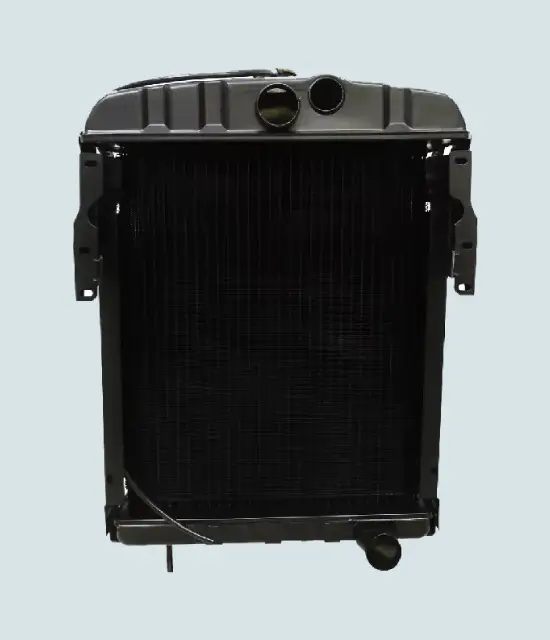about
Agriculture Equipment
As agricultural equipment radiators manufacturers which are used in farm tools like tractors, combine harvesters, and irrigation pumps, are vital in controlling the heat produced during use. These parts help engines and hydraulic systems operate at ideal temperatures, which is important for the efficiency and reliability of agriculture functions.
Purpose of the Radiator
- Engine Efficiency: As top tractor radiators manufacturers makers recognize that adequate cooling has a direct effect on performance. Their systems maintain engines at optimal temperatures, providing clean combustion and full power when you most need it. On those extended harvest days, your gear puts out tremendous amounts of heat that tractor radiators need to effectively dissipate in order to avoid potentially expensive overheating conditions.
- Improve Performance: Properly designed cooling systems by quality agriculture equipment radiator suppliers ensure your equipment operates steadily during prolonged operations, whether plowing, planting, or harvesting in adverse conditions.
- Component Protection: Overheating of the engine can be destructive and can lead to multiple damages and costly repair. Good radiators for tractors safeguard your investment by ensuring safe operating temperatures, greatly increasing the lifespan of pistons, cylinder heads, and other essential components.
- Extended Machinery Life: Investing in agriculture equipment is an essential investment that is highly valuable. The thermal stress can be avoided by proper cooling that speeds up wear and deterioration, allowing your equipment to provide consistent performance season after season, even in the most demanding farming conditions.

Working Principle of a
Radiator in Agriculture Equipment
In farm equipment, the radiator works as a component of the cooling system to manage engine temperature in order to allow the equipment to operate optimally, even under long operations. The following is a step-by-step explanation of the working of a radiator:
Coolant Circulation:
- Cooling commences once the water pump directs coolant (water mixed with antifreeze) through the water jackets in the engine. Engineered by experienced manufacturers of agriculture tractors radiators, these water jackets cover the hottest parts of the engine strategically, and the coolant helps absorb the surplus heat with maximum efficiency.
Flow to Radiator:
- After getting heated, the coolant is directed from the engine towards the radiators for tractors via reinforced heavy-duty hoses withstanding vibration and varying temperatures.
Heat Dissipation in the Radiator:
- Within the cooling unit, the hot coolant passes through a matrix of narrow tubes surrounded by metal fins that greatly enhance surface area for heat transfer—a design optimized by top agriculture equipment radiator manufacturers for maximum thermal efficiency.
Airflow Assistance:
- A strong fan sucks or blows air through the radiator fins, speeding the cooling process as air passes over the hot surfaces. This unit is particularly important in agriculture equipment that regularly works under hot, dusty conditions where airflow could otherwise be inhibited.
Thermostat Regulation:
- A precision thermostat continuously monitors engine temperature and regulates coolant flow accordingly. As your tractor engine warms up during heavy work, it opens to allow more coolant circulation; during light work, it constricts flow to assist in maintaining optimal operating temperature.
Return of Cooled Coolant
- Once it discharges its heat load via radiators for tractors, the cooled fluid re-circulates to the engine to pick up additional heat and undergo a steady cycle that makes your agriculture equipment perform at peak levels.
Benefits of Agricultural Equipment
High Thermal Efficiency
TAE radiators are engineered to provide superior cooling, even in demanding, high-temperature environments. This ensures that agricultural equipment can run efficiently over long periods, reducing the risk of overheating.
Increased Durability
Built with robust materials and reinforced construction, TAE radiators withstand rough conditions, such as exposure to dust, debris, and vibrations, that are common in agricultural operations. This durability translates to longer radiator life.
Corrosion Resistance
Many TAE radiators include corrosion-resistant coatings or materials, protecting them from the moisture, chemicals, and dirt encountered in agricultural environments, which extends their lifespan and reduces maintenance needs.
Optimized Airflow Design
With improved airflow designs, TAE radiators allow effective heat dissipation, even in low-speed or idle conditions, ensuring efficient cooling under all operating conditions.
Custom Fit and Compatibility
TAE radiators are often tailored to fit specific models and types of agricultural equipment, ensuring a perfect fit and optimal cooling performance without needing modifications.
Reduced Downtime and Maintenance Costs
With fewer breakdowns and lower maintenance requirements, TAE radiators help reduce downtime, allowing agricultural equipment to remain operational when it’s most needed, like during planting and harvest seasons.
Environmental Resilience
The sturdy design and resilience of TAE radiators make them suitable for use in extreme temperatures and harsh outdoor environments, typical of agricultural fields.
Testimonials
Recently we bought a Radiators for our Generator. The Product Quality is Excellent .This Company produces custom made Radiators and Spares too. High Quality Products and Service Support.
krishna
CLEANTEK
We got support from ark engineering wonderful work done.He given idea for money save in genset. Ark engineering owner wonderful person.i will strongly recommend to ark engineering.
R.Prasannavenkatesh
Laser Experts India
Coimbatore
We have taken the services of the ark engineering for the service of our genset radiators.it was great Service at a better price .really professional and technical.
Suresh V
FAQ'S
How often should I inspect the radiator in my agricultural equipment?
Regular inspections are recommended, especially before planting or harvest seasons, and during routine maintenance.
What are common issues with radiators in agricultural equipment?
Common issues include coolant leaks, clogs from dirt or debris, corrosion, and damage due to rough terrain.
How can I tell if my radiator is not functioning properly?
Signs may include engine overheating, visible coolant leaks, or reduced performance in machinery.
Can I clean the radiator myself?
Yes, but follow manufacturer guidelines. Routine cleaning may involve flushing the radiator to remove debris.
What type of coolant should I use?
Use the coolant mixture recommended by the manufacturer, typically a mix of water and antifreeze designed for high-temperature operations.